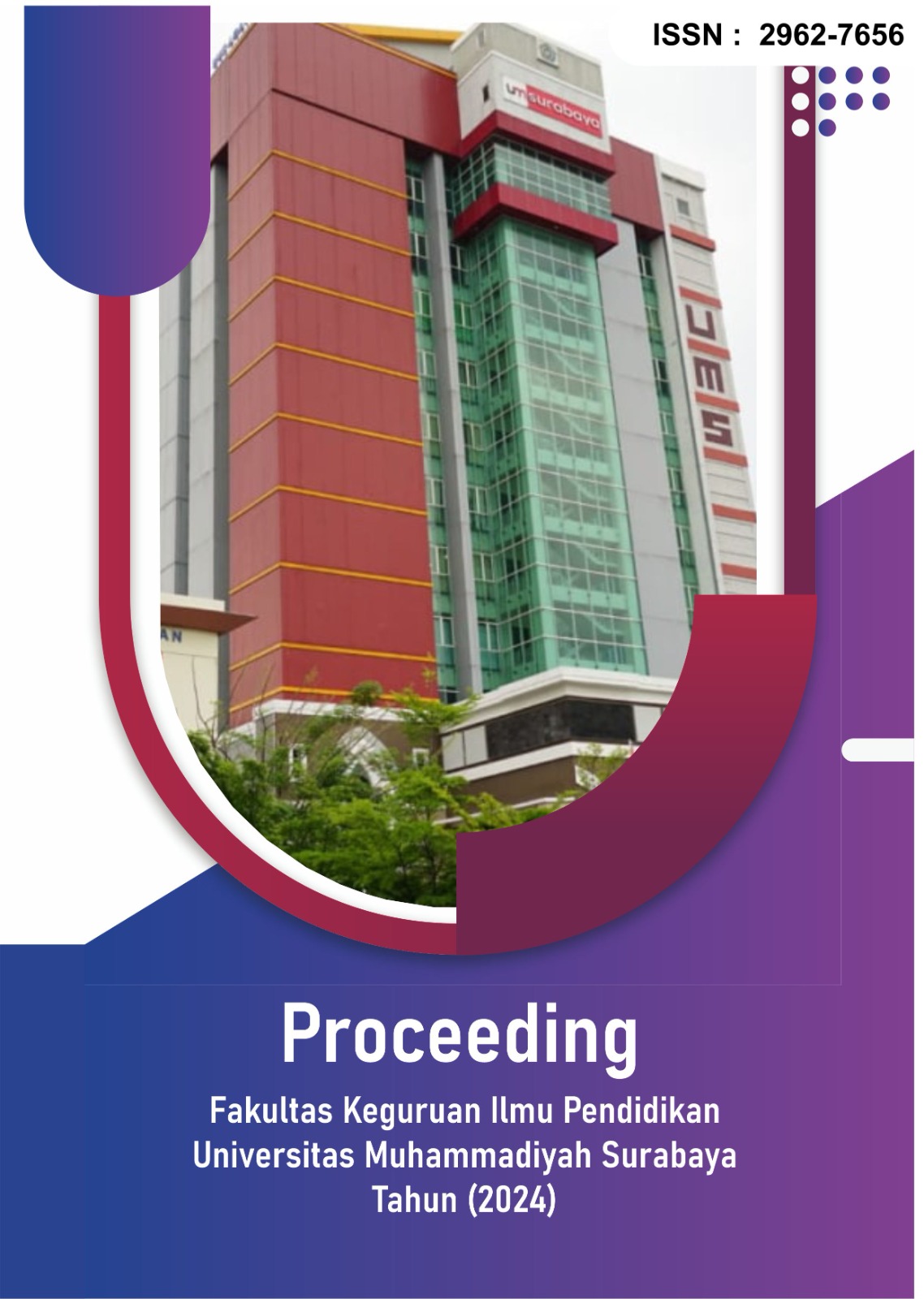KEMAMPUAN KOMUNIKASI DAN BERPIKIR KREATIF PESERTA DIDIK PADA MATERI ORGANISASI KEHIDUPAN MELALUI PENERAPAN MODEL PROJECT BASED LEARNING (PjBL)
DOI:
https://doi.org/10.30651/pc.v1i1.24079Abstrak
21st century education encourages students to master four things: communication, collaboration, creativity, and problem solving. This study aims to: (1) determine the development of students' creative thinking skills by using the PjBL model; (2) determine the development of students' oral communication by applying the PjBL model; (3) describe the learning implementation of the PjBL model; (4) describe students' responses to the PjBL model learning model. This type of research is Pre-Experimental with One Group Pretest and Posttest Design. The research sample was VII A students of SMP Muhammadiyah 3 Surabaya based on purposive sampling technique. Data collection techniques using tests, questionnaires and observations. Data analysis uses descriptive and statistical analysis with n-gain and T-test. based on the results of the study concluded: (1) there is a development of students' creative thinking skills after the application of the PjBL model with an N-Gain value of 0.68 with a “medium” category; (2) there is a development of students' oral communication skills after the application of the PjBL model indicated by an average value of 90 in the “very good” category; (3) learning with the PjBL model is carried out with the mode of “Very Good” criteria; (4) implementation with the model gets a good response from students with a percentage of 95.7%.
Referensi
Azzahra, U., Arsih, F., & Alberida, H. (2023). Pengaruh Model Pembelajaran Project-Based Learning ( Pjbl ) Terhadap Keterampilan Berpikir Kreatif Peserta Didik Pada Pembelajaran Biologi : Literature Review. BIOCHEPHY: Journal of Science Education, 3(1), 49–60.
Dywan, A. A., & Airlanda, G. S. (2020). Efektivitas Model Pembelajaran Project Based Learning Berbasis STEM dan Tidak Berbasis STEM terhadap Kemampuan Berpikir Kritis Siswa. Jurnal Basicedu, 4(2), 344–354. https://doi.org/10.31004/basicedu.v4i2.353
González‐pérez, L. I., & Ramírez‐montoya, M. S. (2022). Components of Education 4.0 in 21st Century Skills Frameworks: Systematic Review. Sustainability (Switzerland), 14(3), 1–31. https://doi.org/10.3390/su14031493
Nurhadiyati, A., Rusdinal, R., & Fitria, Y. (2020). Pengaruh Model Project Based Learning (PJBL) terhadap Hasil Belajar Siswa di Sekolah Dasar. Jurnal Basicedu, 5(1), 327–333. https://doi.org/10.31004/basicedu.v5i1.684
Priyambodo, M., Probosari, R. M., & Indriyanti, N. Y. (2021). Correlation between Self Confidence and Adversity Quotient With Creative Thinking Skills of Grade VIII Students On Subject Motion and Force. Jurnal Phenomenon, 11(2), 231–244.
Putri, A. D., Syutaridho, S., Paradesa, R., & Afgani, M. W. (2019). Peningkatan Kemampuan Komunikasi Matematis Mahasiswa Melalui Inovasi Pembelajaran Berbasis Proyek. JNPM (Jurnal Nasional Pendidikan Matematika), 3(1), 135. https://doi.org/10.33603/jnpm.v3i1.1884
Rahayu, R., Rosita, R., Rahayuningsih, Y. S., Hernawan, A. H., & Prihantini, P. (2022). Implementasi Kurikulum Merdeka Belajar di Sekolah Penggerak. Jurnal Basicedu, 6(4), 6313–6319. https://doi.org/10.31004/basicedu.v6i4.3237
Rosnaeni, R. (2021). Karakteristik dan Asesmen Pembelajaran Abad 21. Jurnal Basicedu, 5(5), 4341–4350. https://doi.org/10.31004/basicedu.v5i5.1548
Sakilah, S., Yulis, A., Nursalim, N., Vebrianto, R., Anwar, A., Amir, Z., & Sari, I. K. (2020). Pengaruh Project Based Learning Terhadap Motivasi Belajar Sekolah Dasar Negeri 167 Pekanbaru. JMIE (Journal of Madrasah Ibtidaiyah Education), 4(1), 127. https://doi.org/10.32934/jmie.v4i1.175
Sari, A. M., Suryana, D., Bentri, A., & Ridwan, R. (2023). Efektifitas Model Project Based Learning (PjBL) dalam Implementasi Kurikulum Merdeka di Taman Kanak-Kanak. Jurnal Basicedu, 7(1), 432–440. https://doi.org/10.31004/basicedu.v7i1.4390
ZamZami, M. R., Wibowo, N. C., Ana Wati, S. F., Ghozali, I., & Imawan, M. R. (2024). Rancang Bangun Sistem Informasi Berbasis Web Menggunakan Metode Waterfall. CYCLOTRON, 7(01), 61–66. https://doi.org/10.30651/cl.v7i01.21084
Sari, S. P., Manzilatusifa, U., & Handoko, S. (2019). Penerapan Model Project Based Learning (PjBL) untuk Meningkatkan Kemampuan Berfikir Kreatif Peserta Didik. Jurnal Pendidikan Dan Pembelajaran Ekonomi Akuntansi, 5(2), 119–131. http://jurnal.fkip.unla.ac.id/index.php/jp2ea/article/view/329
Segundo-marcos, R. (2023). Age-related changes in creative thinking during late childhood : The contribution of cooperative learning. 49(May). https://doi.org/10.1016/j.tsc.2023.101331
Sudarisman, S. (2015). Memahami Hakikat Dan Karakteristik Pembelajaran Biologi Dalam Upaya Menjawab Tantangan Abad 21 Serta Optimalisasi Implementasi Kurikulum 2013. Florea : Jurnal Biologi Dan Pembelajarannya, 2(1), 29–35. https://doi.org/10.25273/florea.v2i1.403
Ghozali, I., Imawan, M. R., Zamzami, M. R., & Zuhri, S. (2023). WEBMAP UNTUK PENGEMBANGAN JALUR IRIGASI BARU DI KABUPATEN LAMONGAN. SATUKATA: Jurnal Sains, Teknik, dan Studi Kemasyarakatan, 1(5), 255-264. https://doi.org/10.47353/satukata.v1i5.1401
Wahyuni, L., & Rahayu, Y. S. (2021). Pengembangan E-Book Berbasis Project Based Learning (PjBL) untuk Melatihkan Kemampuan Berpikir Kreatif pada Materi Pertumbuhan dan Perkembangan Tumbuhan Kelas XII SMA. Berkala Ilmiah Pendidikan Biologi (BioEdu), 10(2), 314–325. https://doi.org/10.26740/bioedu.v10n2.p314-325
Wikanta, W., & Gayatri, Y. (2017). Pembelajaran Berbasis Proyek Dalam Menanamkan. Jurnal Ilmu Pendidikan, 23(2), 171–175.






